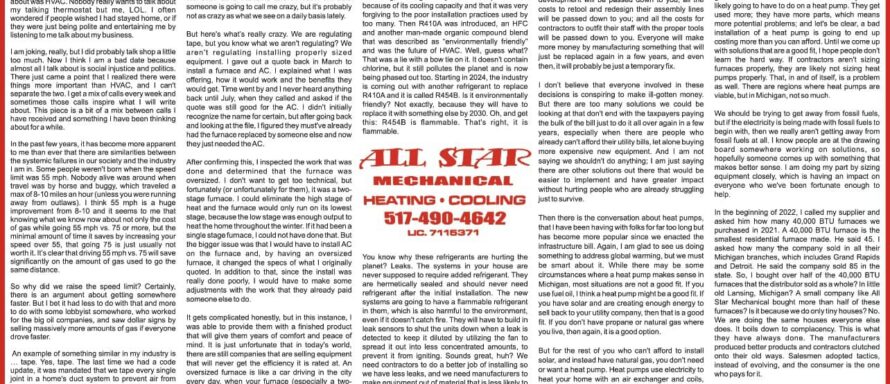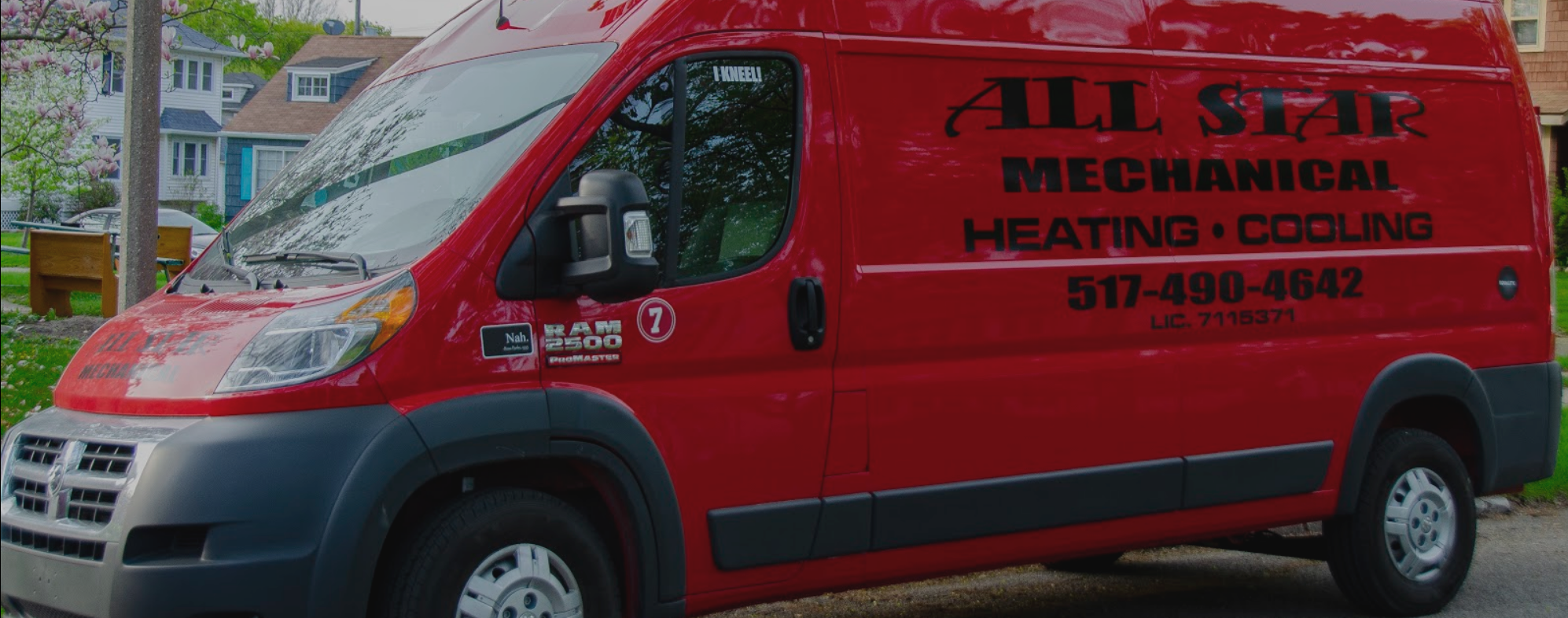

HVAC versus the Planet (or why your furnace is going to cost a lot more next year)
In todays City Pulse for your consideration:
The same people that hate my ads, and say I shouldn’t mix business with personal feelings, will buy from “MyPillow” for the same type of reason that folks call us. But they are blind to their own hypocris. Some of you who have met me may have heard me say this before, but I will say it for the rest of you. I used to be a bad date because all I talked about was HVAC. Nobody really wants to talk about my talking thermostat but me, LOL. I often wondered if people wished I had stayed home, or if they were just being polite and entertaining me by listening to me talk about my business. I am joking, really, but I did probably talk shop a little too much. Now I think I am a bad date because almost all I talk about is social injustice and politics. There just came a point that I realized there were things more important than HVAC, and I can’t separate the two. I get a mix of calls every week and sometimes those calls inspire what | will write about.
This piece is a bit of a mix between calls I have received and something I have been thinking about for a while. In the past few years, it has become more apparent to me than ever that there are similarities between the systemic failures in our society and the industry I am in. Some people weren’t born when the speed limit was 55 mph. Nobody alive was around when travel was by horse and buggy, which traveled a max of 8-10 miles an hour (unless you were running away from outlaws). I think 55 mph is a huge improvement from 8-10 and it seems to me that knowing what we know now about not only the cost of gas while going 55 mph vs. 75 or more, but the minimal amount of time it saves by increasing your speed over 55, that going 75 is just usually not worth it. It’s clear that driving 55 mph vs. 75 will save significantly on the amount of gas used to go the same distance. So why did we raise the speed limit? Certainly, there is an arqument about getting somewhere faster. But I bet it had less to do with that and more to do with some lobbyist somewhere, who worked for the big oil companies, and saw dollar signs by selling massively more amounts of gas if everyone drove faster. An example of something similar in my industry is … tape. Yes, tape. The last time we had a code update, it was mandated that we tape every single joint in a home’s duct svstem to prevent air from escaping the system before it reached its termination at a heat register in a bedroom, bathroom. kitchen. etc. Now in the arand scheme of things, this isn’t a bad idea. But at the same time, unless vour ductwork is on the exterior of a building (like a roof, or a slab outside), then losing airflow inside the home doesn’t seem so significant since it is still within the structure.
So why did we suddenly have to start taping all our duct joints? My suspicion is the same as above. Somebody in the lobby industry had a friend who owned a factory that makes tape, and that guy said, “Hey, I need to sell more tape.” Then he slipped a couple bills to his lobbyist buddy and they put it into the code as a mandate and … voilà! I’m sure someone is going to call me crazy, but it’s probably not as crazy as what we see on a daily basis lately. But here’s what’s really crazy. We are regulating tape, but you know what we aren’t regulating? We aren’t regulating installing properly sized equipment. I gave out a quote back in March to install a furnace and AC. I explained what I was offering, how it would work and the benefits they would get. Time went by and I never heard anything back until July, when they called and asked if the quote was still good for the AC. I didn’t initially recognize the name for certain, but after going back and looking at the file, I figured they must’ve already had the furnace replaced by someone else and now they just needed the AC. After confirming this, I inspected the work that was done and determined that the furnace was oversized. I don’t want to get too technical, but fortunately (or unfortunately for them), it was a two-stage furnace. I could eliminate the high stage of heat and the furnace would only run on its lowest stage, because the low stage was enough output to heat the home throughout the winter. If it had been a single stage furnace, I could not have done that. But the bigger issue was that I would have to install AC on the furnace and, by having an oversized furnace, it changed the specs of what I originally quoted. In addition to that, since the install was really done poorly, I would have to make some adjustments with the work that they already paid someone else to do. It gets complicated honestly, but in this instance, I was able to provide them with a finished product that will give them years of comfort and peace of mind. It is just unfortunate that in today’s world, there are still companies that are selling equipment that will never get the efficiency it is rated at. An oversized furnace is like a car driving in the city every day, when your furnace (especially a two-stage furnace), should be getting highway mileage all of the time (and not at the 75-mph speed, but the55). So, they are regulating tape, which has minimal if any impact on the efficiency. But they are not regulating the sizing of equipment, which has a significant impact not only on the efficiency of that system, but on the grid as whole.
In 1987 The Montreal Protocol was enacted, which phased out HCFC refrigerant R22 because it contained chlorine, which is a greenhouse gas that was depleting the ozone and contributing to global warming. As of 2010, it is no longer legal to import it or manufacture it in the United States. That is not a bad thing, although many contractors preferred it because of its cooling capacity and that it was very forgiving to the poor installation practices used by too many. Then R410A was introduced, an HFC and another man-made organic compound blend that was described as “environmentally friendly” and was the future of HVAC. Well, guess what? That was a lie with a bow tie on it. It doesn’t contain chlorine, but it still pollutes the planet and is now being phased out too. Starting in 2024, the industry is coming out with another refrigerant to replace R410A and it is called R454B. Is it environmentally friendly? Not exactly, because they will have to replace it with something else by 2030. Oh, and get this: R454B is flammable. That’s right, it is flammable.
You know why these refrigerants are hurting the planet? Leaks. The systems in your house are never supposed to require added refrigerant. They are hermetically sealed and should never need refrigerant after the initial installation. The new systems are going to have a flammable refrigerant in them, which is also harmful to the environment, even if it doesn’t catch fire. They will have to build in leak sensors to shut the units down when a leak is detected to keep it diluted by utilizing the fan to spread it out into less concentrated amounts, to prevent it from igniting. Sounds great, huh? We need contractors to do a better job of installing so we have less leaks, and we need manufacturers to make equipment out of material that is less likely to leak and have equipment that checks for leaks before the product leaves their plants. Leaks happen, unfortunately, but much of the problem could be avoided if we just didn’t put the dollar ahead of everything else, because that is what this is all about, really: Work faster, use cheaper material and make more money.
But I digress … manufacturers are now mandated to make this switch next year, and they must redesign all their equipment to comply. The equipment will have new circuitry, will work under different pressures, and will require specialty tools to be installed. All the costs for research and development will be passed down to you; all the costs to retool and redesign their assembly lines will be passed down to you; and all the costs for contractors to outfit their staff with the proper tools will be passed down to you. Everyone will make more money by manufacturing something that will just be replaced again in a few years, and even then, it will probably be just a temporary fix. I don’t believe that everyone involved in these decisions is conspiring to make ill-gotten money.But there are too man solutions we could be looking at that don’t end with the taxpayers paying the bulk of the bill just to do it all over again in a few years, especially when there are people who already can’t afford their utility bills, let alone buying more expensive new equipment. And I am not saying we shouldn’t do anything; I am just saying there are other solutions out there that would be easier to implement and have greater impact without hurting people who are already struggling just to survive.
Then there is the conversation about heat pumps, that I have been having with folks for far too long but has become more popular since we enacted the infrastructure bill. Again, I am glad to see us doing something to address global warming, but we must be smart about it. While there may be some circumstances where a heat pump makes sense in Michigan, most situations are not a good fit. If you use fuel oil, I think a heat pump might be a good fit. If you have solar and are creating enough energy to sell back to your utility company, then that is a good fit. If you don’t have propane or natural gas where you live, then again, it is a good option. But for the rest of vou who can’t afford to install solar, and instead have natural gas, you don’t need or want a heat pump. Heat pumps use electricity to heat your home with an air exchanger and coils, and many can’t heat down to Michigan’s average low temperatures without a backup heat strip. How do they make electricity that is delivered to vour house? They burn natural aas at the power plant. So, either way, unless you are making your own energy through solar; you are de facto burning natural gas.
Heat pumps are also your AC, with a reversing valve. So, if the AC lifespan is 15-20 years, the lifespan of a heat pump is going to be less. It will be used at least three times more than a straight AC, because it will be heating somewhere between 6-8 months a year and cooling 3 months a year. Don’t get me started on how much more service you are likely going to have to do on a heat pump. They get used more; they have more parts, which means more potential problems; and let’s be clear, a bad installation of a heat pump is going to end up costing more than you can afford. Until we come up with solutions that are a good fit, I hope people don’t learn the hard way. If contractors aren’t sizing furnaces properly, they are likely not sizing heat pumps properly. That, in and of itself, is a problem as well. There are regions where heat pumps are viable, but in Michigan, not so much. We should be trying to get away from fossil fuels, but if the electricity is being made with fossil fuels to begin with, then we really aren’t getting away from fossil fuels at all. I know people are at the drawing board somewhere working on solutions, so hopefully someone comes up with something that makes better sense. I am doing my part by sizing equipment closely, which is having an impact on everyone who we’ve been fortunate enough to help. In the beginning of 2022, I called my supplier and asked him how many 40,000 BTU furnaces we purchased in 2021. A 40,000 BTU furnace is the smallest residential furnace made. He said 45. | asked how many the company sold in all their Michigan branches, which includes Grand Rapids and Detroit. He said the company sold 85 in the state. So, I bought over half of the 40,000 BTU furnaces that the distributor sold as a whole? In little old Lansing, Michigan? A small company like All Star Mechanical bought more than half of these furnaces? Is it because we do only tiny houses? No. We are doing the same houses everyone else does. It boils down to complacency. This is what they have always done. The manufacturers produced better products and contractors clutched onto their old ways. Salesmen adopted tactics, instead of evolving, and the consumer is the one who pays for it.
Next year, it is going to be significantly more expensive to replace your home’s HVAC system due to the changes. If you have the means to do it this year, I highly recommend it. We are going to offer 10% off the installation of an furnace and AC if you schedule a consultation in the month of September.






